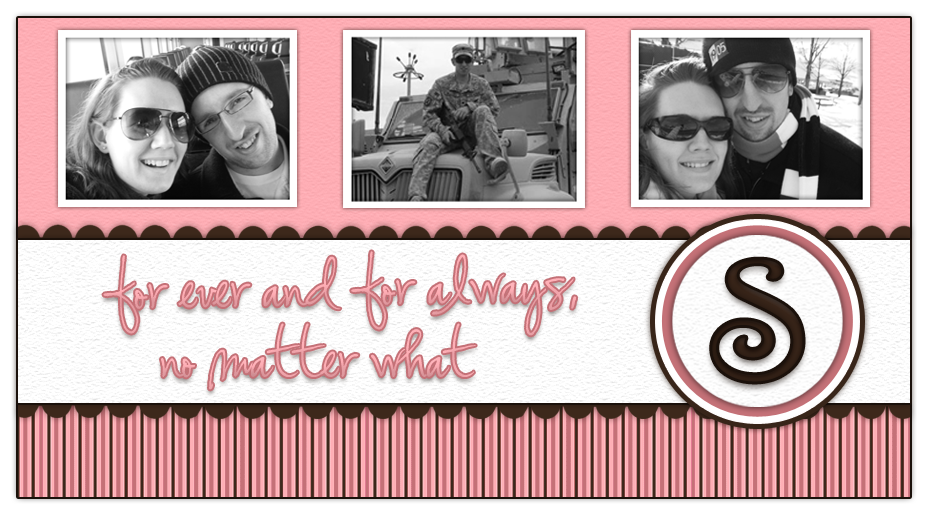I definitely struggle with this. More at the beginning of this deployment than now. When this deployment first started, we were talking on the phone once a week for 15 to 20 minutes. Seth was able to send me an email usually once a week (but it was a great week when I'd get two emails!). I emailed him every night, and even made a list of things to ask him about during our weekly call. But when the phone call time came, the things I had wanted to talk about, just weren't talked about. They seemed little, seemed petty. We had better and more important things to talk about than what I listed. It was a waste of precious time to talk about little things. (Ok and to be perfectly honest, I don't think I talked much because I was holding in sobs and if I said a full sentence he could surely tell that I was crying, which made us both feel like crap. So I mostly just mumbled). I remember talking to his Dad about a month into the deployment. It was an important, financial issue, and we talked about me just taking care of it and not mentioning it to Seth VS telling him about it. I felt like I needed to tell him about it (it was his issue, afterall), but I didn't want to cause him unneeded stress, and possibly cause him to lose focus. After contemplating it in my head for a few days, I ended up telling him. It wasn't want he wanted to hear but he needed to know. Thankfully though, the ability to be able to communicate has greatly improved. We email pretty much every day, I'm able to call him when I want, we text back and forth, and we usually talk on gchat a few times per week. Considering the circumstances, I'm good with the amount of communication we have.
The original article can be found here on the NY Times website, but is also posted below.
A Year at War
KUNDUZ, Afghanistan — Forget the drones, laser-guided bombs and eye-popping satellite imagery. For the average soldier, the most significant change to modern warfare might just boil down to instant chatting.Consider these scenes from northern Afghanistan:
A gunner inside an armored vehicle types furiously on a BlackBerry, so engrossed in text-messaging his girlfriend in the United States that he has forgotten to watch for enemy movement.
A medic watches her computer screen with something approaching rapture as her 2-year-old son in Florida scrambles in and out of view before planting wet kisses on the camera lens, 7,500 miles away.
A squad leader who has just finished directing gunfire against insurgents finds a quiet place inside his combat outpost, whips out his and dashes off an instant message to his wife back home. “All is well,” he tells her, adding, “It’s been busy.”
The communication gap that once kept troops from staying looped into the joyful, depressing, prosaic or sordid details of home life has all but disappeared. With advances in cellular technology, wider Internet access and the infectious use of social networking sites like , troops in combat zones can now communicate with home nearly around the clock.
They can partake in births and birthdays in real time. They can check sports scores, take online college courses and even manage businesses and stock portfolios.
But there is a drawback: they can no longer tune out problems like faulty dishwashers and unpaid electric bills, wayward children and failing relationships, as they once could.
The Pentagon, which for years resisted allowing unfettered Internet access on military computers because of cyber-security concerns, has now embraced the revolution, saying instant communication is a huge morale boost for troops and their families. But military officials quietly acknowledge a downside to the connectivity.
Some commanders worry that troops are playing with iPhones and BlackBerrys (as well as Game Boys and MP3 players) when they should be working, though such devices are strictly forbidden on foot patrols.
More common are concerns that the problems of home are seeping inexorably into frontline life, creating distractions for people who should be focusing on staying safe.
“It’s powerful for good, but it can also be powerful for bad when you’re hearing near real time about problems at home,” said Col. Chris Philbrick, director of the Army’s suicide prevention task force. “It forces you to literally keep your head in two games at one time when your head should be in just one game, in Iraq or Afghanistan.”
It took the military several years to come to terms with both the cyber-security and safety issues. Initially, the Pentagon banned access to social networking sites. But when officials realized that they were falling behind the times and angering young Web-savvy troops, they conducted a study and determined there was more to be gained by allowing access. Classified-network computers still have no access to social networking sites.
To see the upside of a well-connected force, one need look no further than the Morale, Welfare and Recreation building, fondly known as the M.W.R., at Forward Operating Base Kunduz, home to the First Battalion, 87th Infantry for the past year.
In more than 40 plywood cubicles that are available all day, soldiers sit in front of computer terminals or talk on telephones, all of them connected to home. There is virtually no privacy, so the arguments over money and children, the love talk and baby talk, are clearly audible in one cacophonous symphony of chat.
Pfc. Briana Smith, 23, medic and bubbly single mother, is regularly in the M.W.R. checking up on her 2-year-old son, Daniel, who is living with her parents in Tampa. She tries to call home daily and routinely logs onto Facebook to check in with family and friends. And at least once a week, she uses video conferencing on to visit with Daniel.
The close communication thrills her, but can leave a pang, too. “I can’t be involved in the everyday things,” she said. “I only get to see the little tidbits of his life. It’s good to see, but it’s a little heartbreaking at times.”
The Internet connections and phones are not all free. Though troops do not pay to use computers in the M.W.R., they do pay for the phone calls. And those soldiers who bring their own cellphones pay fees that typically start at $70 and frequently run as high as $300 a month. A few chatty soldiers have received bills for more than $10,000 when their texting spun out of control.
To veterans from previous generations, it all seems like something out of science fiction.George Moody, whose son, Billy, is a gunner with the battalion in Kunduz, spent 25 years in the Navy, deploying on ships that were at sea for months at a time. Letters home to his girlfriend and now wife, Mary Jo, sometimes took six weeks to arrive.
“It’s like having a baby again, because we’re back to getting up at 1:30, 2 in the morning to talk to him,” Mr. Moody said. “But we could not live with ourselves if we could not talk to him when he wanted to talk.”
The easy communication can relieve fears — but also stoke them. Once families become used to hearing from troops daily, lapses in communication can send imaginations racing.
Christina Narewski communicates daily with her husband, Staff Sgt. Francisco Narewski, by Skype or instant messaging on their BlackBerrys. But when he does not call back quickly, she frets. “It’s an anxiety just waiting to hear from him again, just waiting to hear when he gets back,” she said.
Barbara Van Dahlen Romberg, a psychologist and founder of a group, Give an Hour, that provides counseling to troops and their families, called the connectivity “a mixed blessing” when couples spend too much time waiting for calls or excessively discussing problems that cannot be repaired long distance.
“It’s just stress, stress, stress,” she said. “I talked to a mom who was counting the minutes between calls from her son. I gently told her that may not be good for either one of them. It is a burden.”
The ability to keep tabs on people at almost any hour can also be dangerous for soldiers suspicious of their lovers or spouses. “It’s nothing to go ask your friend: ‘What was she doing last night?’ ” Pfc. Billy Moody said. “They might tell you one thing, she tells you another, and the next thing you know, there’s drama.”
Specialist Kyle Schulz, for instance, learned via cellphone that his girlfriend was taking up with another man. The news sent him into an emotional tailspin — until he rekindled his relationship with an old girlfriend, by cellphone and Facebook. They later discussed marriage, also on Facebook, until that relationship, too, flickered out.
“In a way I kind of think I had too much communication,” Specialist Schulz, 22, said, “because the more I know back home about what’s going on, the less that I am concentrating out here. And it could potentially hurt me or other people.”
In extreme cases, breakups over cellphones or Facebook have sent soldiers to suicide counseling, or worse. In one case involving a different battalion, a soldier in Iraq killed himself in 2009 after spending hours tracking his girlfriend’s movements and then arguing with her and her sister via cellphone and .
Half an hour after the soldier, Chancellor Keesling, shot himself, his girlfriend sent him an e-mail asking to make up.
“Chance knew exactly who his girlfriend had gone out with and where she was,” said his father, Gregg Keesling. “She stopped taking his calls, and that is what really sent him into the spiral.”
In Kunduz, the battalion chaplain, Capt. Tony Hampton, said he often advises soldiers to shut off the phone and stay away from the computers when tensions are brewing with loved ones back home. Take some time to think, he counsels. Write a letter.
He doubts anyone listens.
“The access is too easy for them and they just can’t rest,” he said. “This is the microwave generation. They need it, and they need it fast.”








